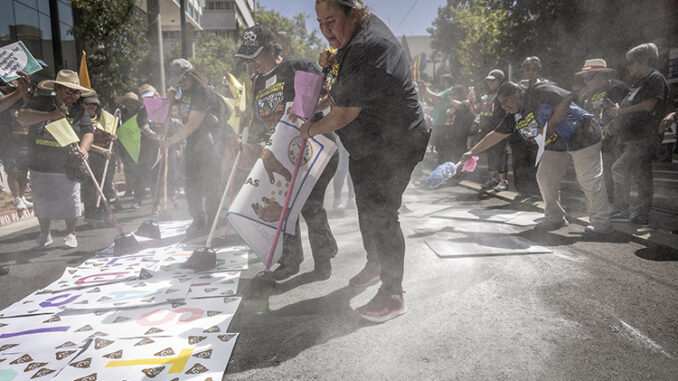
Dozens of domestic workers laid banners on the state Capitol grounds Tuesday that spelled out the words “racist” and “injustice.” Then they cleaned them up.
It was all part of a rally of several hundred domestic laborers to urge state lawmakers to pass more workplace protections. Aminta Morales, 46, a Guatemalan immigrant who cleans houses in San Francisco, said she worries about breathing in cleaning chemicals and hurting herself.
- Morales: “How long will my lungs resist the cleaning supplies? Every time I arrive at home I am prone to accidents. Once I fell on a bathtub and my back hurt a lot, but I had to keep working. What are my kids going to eat in Guatemala?”
The rally promoted a bill that state Sen. María Elena Durazo, a Los Angeles Democrat, introduced earlier this year that would secure health training and safety equipment for workers like Morales.
- Durazo: “This is about how you help a household in becoming safer. There’ll be those who want to exploit that domestic worker. We saw many examples during the fires, when domestic workers were asked to come and clean without safety equipment that they needed.”
Gov. Gavin Newsom vetoed an earlier version of this bill in 2020, saying turning private households into worksites would prove onerous for renters and homeowners.
Since then, Durazo’s office has made changes to the bill. It has been placed on the suspense file, which means it will become one of hundreds of bills the Legislature will vote on Friday with little discussion.
Also Tuesday, Democratic state Sen. Monique Limón of Santa Barbara gathered with restaurant workers and the nonprofit One Fair Wage to promote her Senate Bill 476, which would require restaurants — not workers — to pay for mandated food safety training.
The proposal is in response to a January report by The New York Times that the National Restaurant Association used $25 million from the training program, run by a company called ServeSafe, to fund lobbying efforts against minimum wage increases.
- Limon: “Restaurants and ServeSafe have used worker funds in such a way that is not in the interest of workers’ rights, rights that California workers deserve and fought for tirelessly, like a living wage.”
Stella Denig, a co-owner of the Oakland restaurant Daytrip, spoke in support of the legislation, arguing that she already covers training costs (which can total as much as $15 per worker over three years) because it is better and safer for businesses, customers and employees when staff is properly trained.
In other legislative developments:
- Bakersfield Assemblymember Jasmeet Bains joined a crime victims group and the state district attorneys association to speak Tuesday against SB 94, authored by fellow Democratic Sen. Dave Cortese of Santa Clara. Cortese’s bill would allow certain prisoners serving a life sentence without parole to petition courts for resentencing. Describing the measure as disrespectful to crime victims, Bains contended that it would make “some of the most dangerous and violent murderers eligible to leave their prison cells and return to some of the same communities they once terrorized.”
- While the Legislature approved a bill by Assemblymember Buffy Wicks on Monday to reverse a state court decision that blocked a UC Berkeley student housing project, CalMatters’ higher education reporter Mikhail Zinshteyn explains that it won’t actually jump-start construction. The university said it can’t begin building until the state Supreme Court decides on its appeal, and the Legislature can’t tell the courts how to handle a case.



Be the first to comment